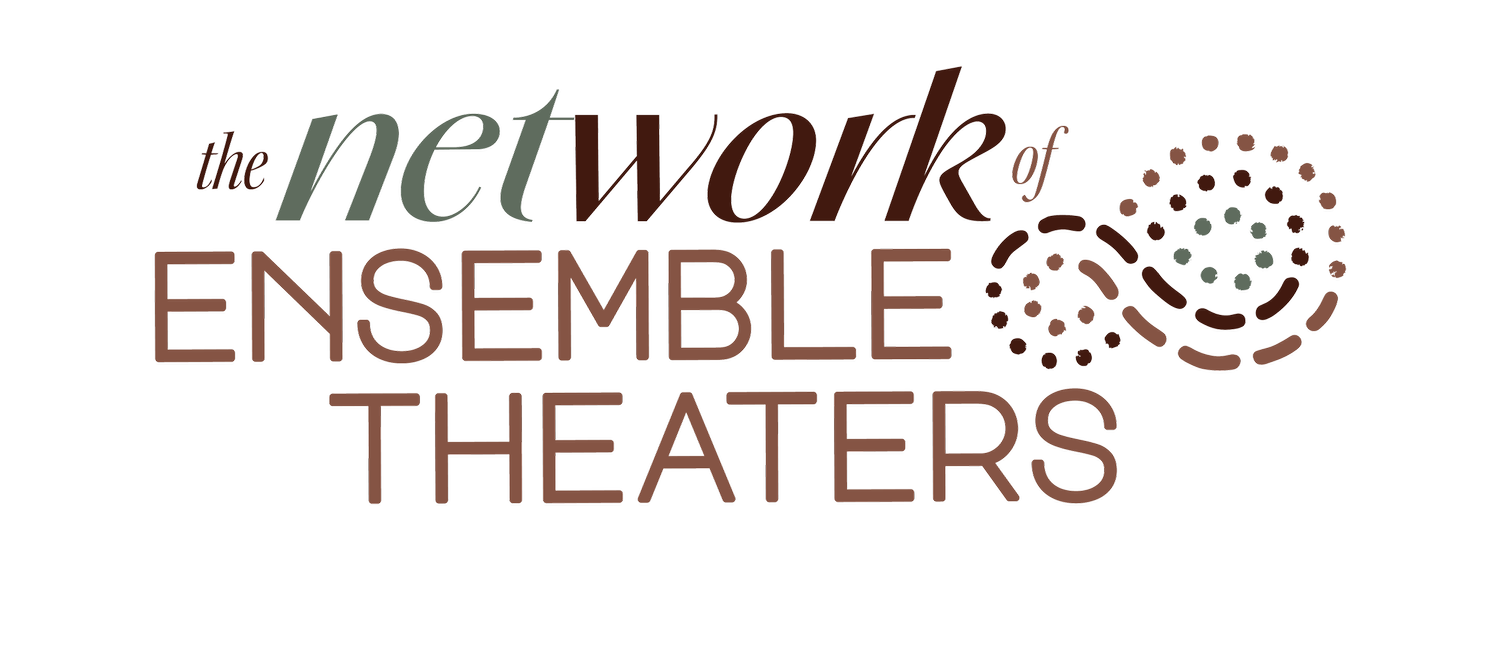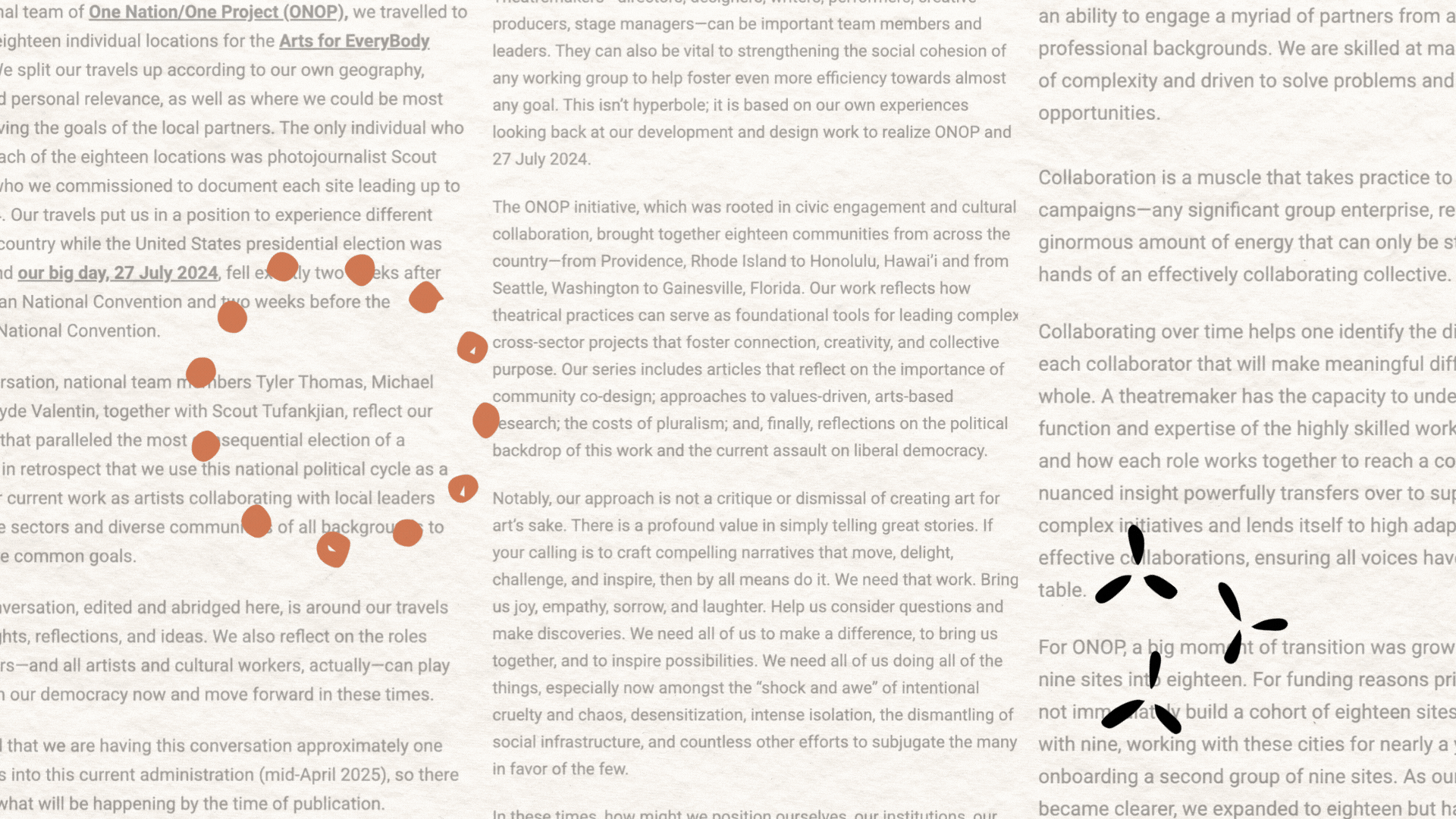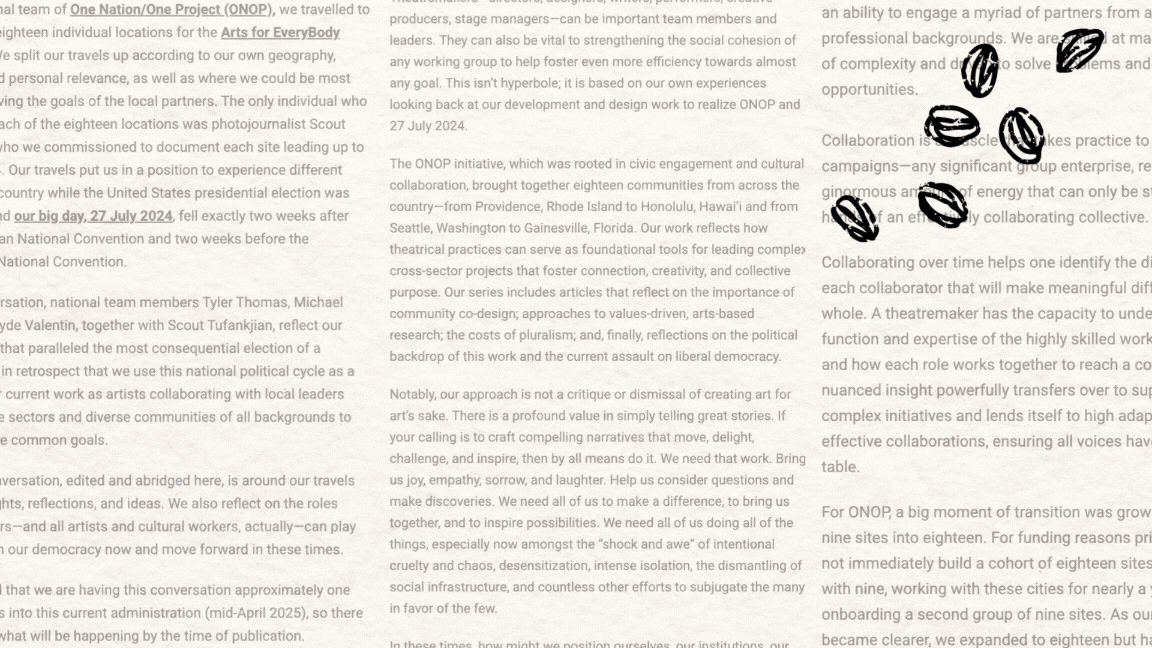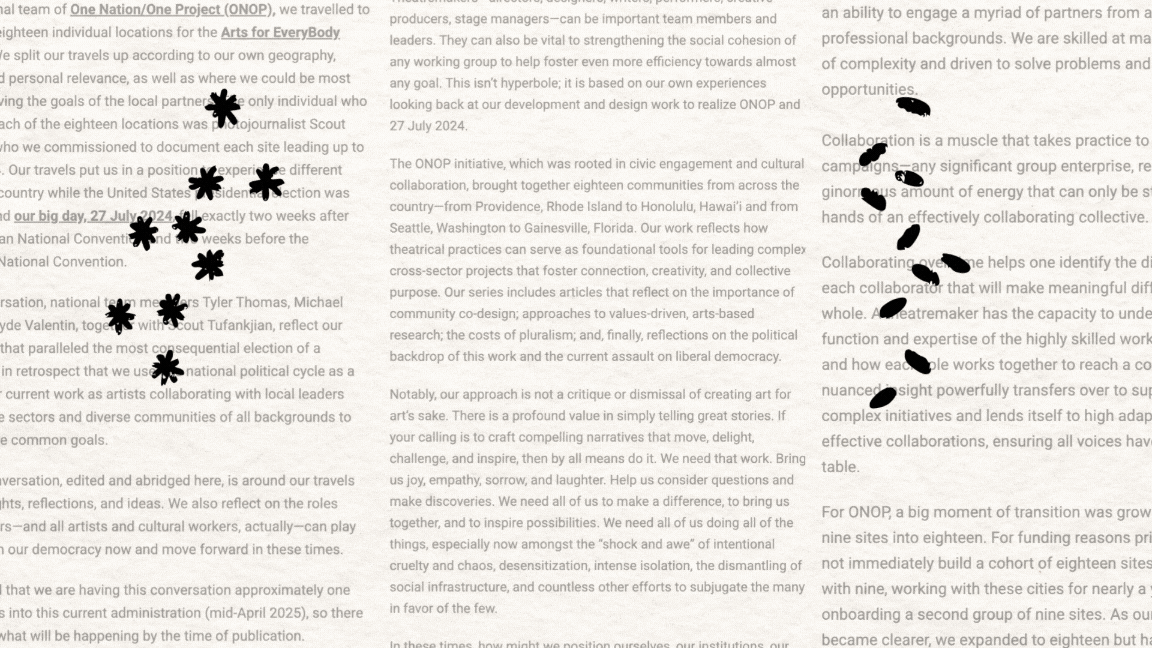We Practice The Future Together
A Reflection by Alexandra Meda
I've been sitting with this HowlRound series, The Intersection of Arts and Health: One Nation/One Project (ONOP) Reflects on Arts for Everybody, and honestly—it won't let me go.
These aren't just essays. They're reminders. Of the stakes we're navigating. Of the quiet truths we hold. Of what we've always known as artists, and what we forget in the grind to survive.
What a diagnosis. And what a call to practice!
One insight that keeps surfacing for me is this: democracy is in peril not because it lacks ideas, but because we, the people, lack the muscle memory of a truly pluralistic civic life.
And yet, if you've been part of the ensemble field for even a minute, you know we've been building that memory in rehearsal rooms for decades. We're not new to co-creation. We're not new to complexity. We're not new to the tension of difference. We've just never been resourced to scale it as infrastructure. These essays are a reminder: we're already holding the technology for civic health. We always have been.
The Muscle Memory We've Been Building
I think about the countless times I've watched ensembles navigate impossible conversations. The way a group of strangers becomes a creative unit capable of holding each other's most vulnerable offerings. The way conflict transforms into deeper collaboration when there's enough trust in the room. The way we've learned to make space for everyone's intelligence without losing our collective focus.
These aren't just artistic skills. They're civic skills. They're the exact muscles our democracy needs to remember how to flex.
Here's what I want to push further: What if we stopped calling these "artistic skills with civic applications" and started calling them what they really are, civic infrastructure built from a foundation of ensemble methodology? What if instead of only asking for arts funding, we started billing municipal governments for conflict resolution services? For consensus-building workshops? For community visioning processes?
The challenge, of course, is that we can't co-design from a distance. We have to slow down and listen differently. Christina D. Eskridge puts it perfectly in “Co-Design & the Power Of Coalition”:
"Co-design requires trust, and therefore co-design may not be a fast process."
That insight stirs much within me. Because when we gather, whether at a Meet-Up, a Regional Gathering, or in Create + Activate, we ARE listening differently. We are refusing to flatten each other into one identity, one need, one story. We're letting proximity do its work. Letting the warmth of proximity rewire what traditional institutional practice often make us forget.
Hot Take: How often do we actually trust what we're hearing? How often do we let that different kind of listening change our plans, our assumptions, our sense of what's possible? Because the ONOP essays make clear that real co-design isn't just about creating space for voices, it's about letting those voices reshape the work itself.
Where we need to go: The cities already experimenting with artist-facilitated community processes are seeing measurably better outcomes, higher participation rates, more creative solutions, and less polarization. What if we invested the time in scaling this approach? What if we documented and disseminated these methods well enough that any community could replicate them? What if we stepped outside of our bubbles and pushed?
Imagination in Motion
What strikes me about civic imagination is that it isn't a fixed vision; it's co-designed in motion. In “How Creative Research Strategies Can Center Community voices”, Nicole Morgan, Alexandra Rodriguez, Shanae Burch, and Jill Sonke capture this beautifully:
"When we prioritize personalized engagement, meaning-making, and mutual value exchange, research participation can shift from an extractive process to a collaborative one."
And that's exactly what this year has been for me. For all of us at NET. Not a rollout of a perfect plan. But a living re-visioning, shaped in real time by feedback, contradiction, and care. The only reason we've made it through is because enough of you said yes. Yes to imagining with us, even when the edges weren't clear.
This series, and the work at NET is challenging the way we're taught to think about leadership and vision. We're supposed to have the answers, the clear path forward.
A fundamental truth for me: our strength as a field is precisely that we don't have all the answers, but it is our willingness to hold uncertainty, to let the work emerge through relationship, is exactly what this moment requires.
On paper, the Regional Meet-Ups we're planning are gatherings. In practice, they're experiments in what happens when we trust the collective wisdom in the room more than any individual agenda. They're practice rounds for the kind of civic engagement ONOP is describing: where the process matters as much as the outcome, where everyone's presence shifts what becomes possible.
But let me be more specific about what we're testing: Can a gathering designed like ensemble creation actually generate more actionable community solutions than traditional town halls? Can artist-facilitated listening sessions produce better policy recommendations than expert panels? Can we honor how old these practices are? Can we honor that they have been birthed through liberation movements and organizing, and, can we document and resource enough artists and practitioners properly so that there are no communities that cannot access them?
Because if the answer is yes, and I believe it is, then we're not just making a case for more arts funding. We're making a case for completely restructuring how democracy operates at the local level.
The True Cost of Our Work
Here's what I know to be true: pluralism is expensive, but monoculture costs us everything. In “The Cost Of Pluralism”, Tyler Thomas and Michael Rohd frame it this way: "plurality demands a higher tolerance for discomfort, frustration, and friction."
And that's not a metaphor. That's real. This is about our programming choices, our hiring practices, our budgets. It’s our board composition. It’s who we listen to when we're afraid. We survive this moment not by trimming ourselves down to be palatable, but by showing up in all our difference, on purpose.
I want to sit with the word expensive for a moment. There are so many invisible costs to this work. The emotional labor of holding complexity is unquantifiable. The time it takes to build real consensus is not easily measured on a line item. The vulnerability required to let other people's perspectives change us is a whole lifetime of effort. The way this work asks us to show up as whole people, not just as our professional roles has a cost. It brings deep rewards, but it costs something quite tangible for each individual.
What it costs us collectively must also be measured. The slower decision-making processes. The messier timelines. The way we have to keep explaining our values instead of just executing our plans. The constant translation work between different communities, different ways of understanding the world.
This is the foundation of ensemble process. I think of meetings where we start with breathing because someone is grieving and we don't pretend otherwise. Why don’t we question the fact that most ensemble budgets don't have a line for "grief time" but we build it in anyway. We have so much as a muscle memory. It’s the transactional nature of the mainstream sector of our field that intentionally trains us to forget.
But here's the economic reality I want to name: This work requires real budgets, real decision-making power; not in the form of volunteer advisory capacities. Let's move from being consulted to being co-creators with agency. Now, that's expensive in every sense, financially, politically, structurally. It's also revolutionary. It’s how we step forward.
What if we costed it out properly? What if we calculated the actual value of conflict resolution, community building, and consensus facilitation at market rates? What if we stopped undervaluing this labor and started charging what organizational development consultants charge? What if we also gave it out for free in the areas most in need of it?
I am asking what if we positioned ourselves not as arts organizations doing community work, but as civic infrastructure providers.
I'm talking about a fundamental shift in how we see ourselves and how we price our work. Because the crisis in American theatre and the crisis in American democracy aren't separate problems. And the solution isn't continuing to keep ourselves separate and on the side and limiting our asks for more funding just for arts. It's recognizing that civic infrastructure IS artistic practice.
Practicing How to Be
What I want to leave you with is this: we're not just performing onstage. We're practicing how to be with each other. In “Theatermakers as Movement Builders”, Clyde Valentin, Nataki Garrett, and Tyler Thomas frame it beautifully:
"Together, let’s widen the frame: theatre not just as performance, but as practice for collective action."
Yes. That's what I want to leave you with. Because everything I'm describing, every piece of this field thread, is already happening. Has been happening. Has been built on the shoulders of the culture bearers and community organizers working across decades. That’s so many of you. Because you're practicing how to be with each other in ways the broader world hasn't figured out yet.
Real Question: Are we practicing at the scale this moment requires? Are we letting our rehearsal room wisdom inform how we engage with systems beyond our immediate artistic communities? Are we applying our collaboration skills to the work of building the cultural infrastructure our democracy needs?
Ensemble practitioners and the Ensemble Arts field have already proven what happens when artists step into civic leadership roles; not as advocates for the arts, but as practitioners of the collaborative creation our communities need, something shifts. The work becomes both more artistic and more political. More aesthetic and more systemic. More personal and more structural. What I take from this powerful series of essays is what could happen if this became an entire mainstream performing arts mandate.
But let me be concrete about what that mandate would look like:
Tomorrow: Ensemble artists who are already doing this work start naming it properly, understanding its value (not just monetarily- but that too).
Next year: Every city in America has an artist-in-residence focused specifically on democratic processes, not cultural programming.
In five years: Ensemble methodology is taught in every public policy program, every conflict resolution certification, every community organizing training.
The Technology We Are Already Holding
It's not a metaphor when we say ensemble work is world-building. It's a muscle. It's a method. It's a map. And we're learning how essential this muscle is in this very tumultuous moment.
What if we trusted what we know to be true? What if we understood that every ensemble process could be civic practice? What if we understood every collaborative creation as a small-scale experiment in the kind of democracy we're trying to build?
We know how to create the conditions for collective imagination. We know how to hold space for difference without losing coherence. We know how to make something together that none of us could make alone.
That's not just artistic skill. That's civic technology. That's the infrastructure our democracy needs to remember how to use.
Democracy literally cannot function without these skills. The reason our political systems are failing isn't just because of bad actors or wrong policies; it's because we the people have been forced to forget how to be in creative relationship with difference. We've lost the large scale practice of collective imagination. We've stopped believing that we can resist in ways that impact.
The question isn't whether we'll engage with the moment we're in. The question is whether we're ready to stop being peripheral to democracy and start being central to it.
The Practice Continues…
This summer, as NET takes our Regional Meet-Up Tour across the country, we're not just connecting with each other. We're practicing the future together. We're demonstrating that another way is possible. We're building the muscle memory of pluralistic civic life, one gathering at a time.
And we're documenting everything. Not just what happens, but how it happens. What exercises create breakthrough moments? What facilitation techniques actually shift group dynamics? How do we replicate the conditions that allow strangers to become collaborators?
Because our goal isn't just to have meaningful gatherings. Our goal is to disseminate replicable frameworks based in ensemble methodologies that any community can use. Our goal is to prove that ensemble practices scale. Our goal is to build the civic infrastructure our democracy needs.
And when we come back together; whether in person or through the digital threads that connect us, let's bring what we've learned. Let's share what we've discovered. Let's keep practicing how to be with each other in ways that make democracy work.
This moment isn't asking for conclusions. It's asking for practice. For courage. For experiments that don't tie up cleanly but plant something lasting. It's asking us to stop being artists who dabble in civic engagement and start being civic infrastructure providers using artistic methods.
So, I offer this to the field and to each of you who are still here with NET through these trying times and through our transition; not as a thesis, but as a provocation and maybe even a roadmap:
What if we stopped asking for permission to be essential? What if we stopped begging for funding and started working at a scale where there is no artist or administrator without access to mental healthcare, benefits, and the ability to retire with dignity? What if we stopped seeing ourselves as peripheral to democracy and started seeing ourselves as its foundation?
From the deepest places in my body, thank you.
Thank you for practicing pluralism in the dark. Thank you for making time in the margins. Thank you for building the cultural infrastructure we need, especially when no one funds it. Thank you for showing up to the invitation. Still.







